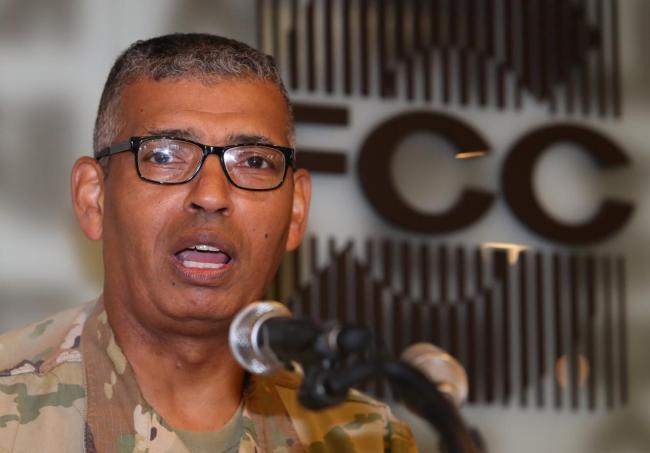USFK chief calls on N. Korea to take ‘earnest, serious’ steps to denuclearize
By YonhapPublished : Aug. 22, 2018 - 16:20
US Forces Korea Commander Gen. Vincent Brooks called on North Korea on Wednesday to take “earnest and serious” steps toward denuclearization, citing distrust and misconception as major hurdles to ongoing peace efforts.
During a press conference, Brooks also pointed out the need for continued international pressure on the communist regime to ensure it follows through on its avowed commitment to the complete denuclearization of the peninsula.
“We still have to see earnest actions being taken on those matters of great concern like denuclearization. There is still a need for continued pressure so that there is not a reason for North Korea to back up,” the commander said.
During a press conference, Brooks also pointed out the need for continued international pressure on the communist regime to ensure it follows through on its avowed commitment to the complete denuclearization of the peninsula.
“We still have to see earnest actions being taken on those matters of great concern like denuclearization. There is still a need for continued pressure so that there is not a reason for North Korea to back up,” the commander said.

“They’ve already taken very important steps toward peace, but these steps must be followed by more serious steps on denuclearization, as well as trust-building. ... The international pressure that helps create this must continue,” he added.
Brooks went on to say, “Actions to reduce tension can be done concurrently with broader international pressure.”
His remarks came amid concerns that Seoul’s push for cross-border exchanges, such as the planned opening of an inter-Korean liaison office in the North’s border city of Kaesong, could attenuate or unravel the international sanctions regime.
Seoul’s cross-border engagement coincides with reports the US and North remain apart over the sequence of the denuclearization process, with the latter calling for the political declaration of a formal end to the 1950-53 Korean War.
Despite ongoing diplomacy, Brooks still takes the North’s security challenge seriously.
“The danger is greater than ever. It is not the same, now that there is a nuclear threat that presents an intercontinental threat that can range countries throughout the world ... all of the alliances of the US ... make it a very different circumstance with a higher potential, higher cost for miscalculation,” he said.
The top officer cast distrust as a major obstacle to ongoing peace efforts.
“Distrust is still a dominant factor in the situation. Misperception is yet another where actions taken by one party are not understood the way they were intended to be by the actor when the receiver sees it,” he said.
“The potential for the successful outcome through earnest commitment by all parties involved if they can work through these same factors of distrust and misperception is relatively high. As a result, I think there is cause for cautious optimism,” he added.
Regarding the issue of the end-of-war declaration, the commander said its definition should first be clearly specified.
“What it means has to be very clear ... that needs to be understood in advance. And what it doesn’t mean also perhaps has to be understood,” he said. “Those key elements have not been worked out in sufficient detail for such an agreement to be made at the present time.”
Brooks, in addition, voiced skepticism about “any solution that does not have denuclearization.”
Asked to comment on Seoul’s plan to pull out some 10 border guard posts to reduce military tensions, Brooks, who leads both the UN Command and the South Korea-US Combined Forces Command, gave two different answers.
“As a UN commander, I support this initiative that can reduce military tension along the Military Demarcation Line,” he said.
“As the CFC commander responsible for defending the Republic of Korea, I have some concerns about what that means militarily to the ability to defend along the MDL and in depth beyond it. I believe there is a reasonable degree of risks involved in this, not an excessive amount of risk,” he added.
The UNC oversees the Armistice Agreement that halted the Korean War, while the CFC is an institution that provides force in case of contingencies.
Asked whether South Korea is currently capable of retaking wartime operational control from the US, Brooks said now is not the time.
“Among those conditions (for the transfer) are the command and control structure for controlling forces, some critical military capabilities that need to be in the possession of the Republic of Korea Armed Forces, the actual conditions of the environment,” he said.
“All these things are factors that are taken into account. We are making progress in each of these areas, but the time is not ripe to make a change yet.” (Yonhap)



![[AtoZ into Korean mind] Humor in Korea: Navigating the line between what's funny and not](http://res.heraldm.com/phpwas/restmb_idxmake.php?idx=644&simg=/content/image/2024/04/22/20240422050642_0.jpg&u=)
![[Exclusive] Korean military set to ban iPhones over 'security' concerns](http://res.heraldm.com/phpwas/restmb_idxmake.php?idx=644&simg=/content/image/2024/04/23/20240423050599_0.jpg&u=20240423183955)



![[Graphic News] 77% of young Koreans still financially dependent](http://res.heraldm.com/phpwas/restmb_idxmake.php?idx=644&simg=/content/image/2024/04/22/20240422050762_0.gif&u=)
![[Herald Interview] Why Toss invited hackers to penetrate its system](http://res.heraldm.com/phpwas/restmb_idxmake.php?idx=644&simg=/content/image/2024/04/22/20240422050569_0.jpg&u=20240422150649)






![[Exclusive] Korean military to ban iPhones over security issues](http://res.heraldm.com/phpwas/restmb_idxmake.php?idx=652&simg=/content/image/2024/04/23/20240423050599_0.jpg&u=20240423183955)



![[Today’s K-pop] Ateez confirms US tour details](http://res.heraldm.com/phpwas/restmb_idxmake.php?idx=642&simg=/content/image/2024/04/23/20240423050700_0.jpg&u=)